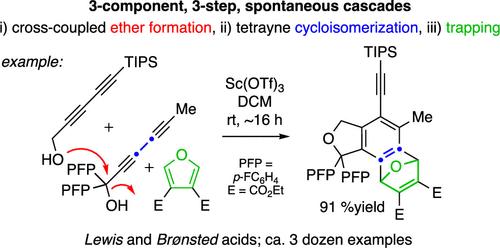酸催化,三组分,自发级联1,3-丁二炔丙炔醇合成酞菁衍生物的途径
IF 13.1
1区 化学
Q1 CHEMISTRY, PHYSICAL
引用次数: 0
摘要
我们已经建立了一个环境温度,一锅,酸催化,三组分的过程,涉及原位形成四炔或三炔,自发环化成苯中间体。这被迅速捕获,以提供多样化的多环酞衍生物。采用炔底物和苯捕获试剂的不同组合,增强了产物结构的多样性。该级联反应用途广泛,效率高,可由多种Lewis和Brønsted酸催化剂催化。在水环境甚至无溶剂环境中都能成功。本文章由计算机程序翻译,如有差异,请以英文原文为准。

Acid-Catalyzed, Three-Component, Spontaneous Cascades of 1,3-Butadiynyl Propargylic Alcohols as a Route to Phthalan Derivatives
We have established an ambient temperature, one-pot, acid-catalyzed, three-component process involving in situ formation of a tetrayne or triyne that spontaneously cyclizes to a benzyne intermediate. This was rapidly captured to give a diverse range of polycyclic phthalan derivatives. Product structural diversity was enhanced by employing various combinations of alkyne substrates and benzyne trapping reagents. This cascade reaction was versatile and efficient and could be effected by a variety of Lewis and Brønsted acid catalysts. Success in an aqueous or even a solvent-free environment was demonstrated.
求助全文
通过发布文献求助,成功后即可免费获取论文全文。
去求助
来源期刊

ACS Catalysis
CHEMISTRY, PHYSICAL-
CiteScore
20.80
自引率
6.20%
发文量
1253
审稿时长
1.5 months
期刊介绍:
ACS Catalysis is an esteemed journal that publishes original research in the fields of heterogeneous catalysis, molecular catalysis, and biocatalysis. It offers broad coverage across diverse areas such as life sciences, organometallics and synthesis, photochemistry and electrochemistry, drug discovery and synthesis, materials science, environmental protection, polymer discovery and synthesis, and energy and fuels.
The scope of the journal is to showcase innovative work in various aspects of catalysis. This includes new reactions and novel synthetic approaches utilizing known catalysts, the discovery or modification of new catalysts, elucidation of catalytic mechanisms through cutting-edge investigations, practical enhancements of existing processes, as well as conceptual advances in the field. Contributions to ACS Catalysis can encompass both experimental and theoretical research focused on catalytic molecules, macromolecules, and materials that exhibit catalytic turnover.
 求助内容:
求助内容: 应助结果提醒方式:
应助结果提醒方式:


